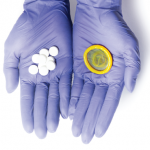- Start ACE inhibitor therapy if the patient develops scleroderma renal crisis.
Numerous, specific recommendations were made for pregnancy management in aPL-positive women, both those who do and do not meet APS Classification Criteria clinical thresholds, and for women positive for anti-Ro/SSA and anti-La/SSB antibodies.4 Most of the patient panelists supported frequent fetal echocardiograms for women who are anti-Ro and anti-La positive, Dr. Sammaritano noted.
Medication Use
Due to lack of evidence, questions remain about the use of non-tumor necrosis factor (TNF) biologics and small-molecule therapies for both men and women, so panelists did not vote on recommendations about these drugs, Dr. Sammaritano said.
The guideline encourages both women and men to discuss medication use with their rheumatologist before conceiving, and to discuss future pregnancy plans before initiating treatment with medications that may affect fertility, such as cyclophosphamide. It also urges rheumatologists to counsel women who have inadvertent exposure to teratogenic medications during pregnancy to stop the drug immediately and refer these patients to a maternal-fetal medicine or genetics specialist.
Recommendations for men include:
- Discontinue cyclophosphamide 12 weeks before and thalidomide four weeks before attempting to conceive with his partner;
- Continue hydroxychloroquine, colchicine, azathioprine, TNF inhibitors, sulfasalazine, methotrexate, leflunomide, mycophenolate, cyclosporine, tacrolimus, anakinra and rituximab; and
- Consider semen analysis if a man has trouble conceiving while on sulfasalazine.
Patient panelists suggested rheumatologists counsel female patients on the risk of not taking pregnancy-compatible medications. The guideline’s many recommendations for pregnant women include:
- Discontinue cyclophosphamide, thalidomide, mycophenolate, methotrexate and leflunomide, with a “wash out” of leflunomide before pregnancy and immediately if pregnant;
- Consider stopping non-steroidal anti-inflammatory drugs (NSAIDs) if a woman has difficulty conceiving, and don’t use NSAIDs in the third trimester;
- Continue hydroxychloroquine, sulfasalazine, colchicine and azathioprine during pregnancy. Continue TNF-
inhibitors during pregnancy if clinically necessary; - Consider cyclophosphamide (in the second or third trimester) or rituximab during pregnancy in women with organ- or life-threatening disease; and
- In women on non-fluorinated steroid therapy, continue low-dose steroids if needed.
Good practice statements on lactation include: Rheumatologists should encourage their female patients to breastfeed if they desire, maintain disease control with medications compatible with lactation, and review the risks and benefits particular to each patient. Other recommendations:
- While breastfeeding, avoid cyclophosphamide, thalidomide, mycophenolate, leflunomide and methotrexate, and continue hydroxychloroquine, TNF inhibitors, rituximab and non-fluorinated steroids; and
- Women on higher (20 mg or more per day) steroid doses should avoid breastfeeding within four hours of taking their drug—and discard any milk pumped or expressed in that same window.
To illustrate the application of the guideline’s recommendations, panelists presented various case scenarios for patients with rheumatic diseases. Example: Bonnie L. Bermas, MD, a rheumatologist at University of Texas Southwestern Medical Center, Dallas, offered the following case scenario: a 29-year-old woman who develops RA six months postpartum. She does not plan to attempt another pregnancy for three years. “You are thinking of starting her on methotrexate. What are reasonable choices for contraception?” Dr. Bermas asked.
The new guideline offers a good practice statement for rheumatologists to consider in this case: “In women with rheumatic diseases who are sexually active and of childbearing age, we suggest discussing the use of contraception and plans for pregnancy at an early visit when initiating therapy with potentially teratogenic medications,” Dr. Bermas said.
The guideline also includes a strong recommendation that, in women without SLE or aPL/APS, hormonal contraception or IUD is more effective than other contraceptive forms, and a conditional recommendation to use an IUD or progestin subdermal implant over other hormonal contraception options in this patient. “The patient agrees to have an IUD inserted,” she said.


